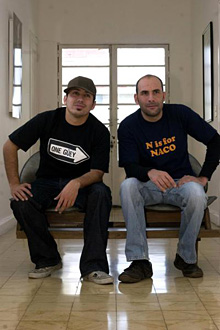 |
 |
 |
 Business News | March 2007 Business News | March 2007  
Mexican Shirt Company Makes Waves by Touting Tacky to a Tee
 Reed Johnson - LATimes Reed Johnson - LATimes


| | Edoardo Chavarín, left, and Fernando García plan to open 30 NaCo. shops in Mexico. They have already sold $1 million in biculturally cool clothing. (Sarah Meghan Lee - LATimes) |
Mexico City — The word is "naco," and in the past it usually translated as "tacky," "vulgar" or "cluelessly unfashionable." Depending on who's saying it, naco sometimes can carry uglier associations, as a furtive put-down of people with dark skin and second-grade educations who dwell in distant mountain villages and grim urban slums.

But in Mexico these days, naco (pronounced NAH-ko) is becoming chido ("cool"), thanks in no small part to NaCo., a T-shirt and accessories company that has become one of the country's hottest brand names by declaring that it's hip to be déclassé. After all, as the company's directors point out, being naco isn't necessarily a matter of money, education or social position.

"You can be more middle class, poor or rich, and still be naco," says Fernando García, 33, NaCo.'s operations director. "Putting neon lights around your license plate on your Mercedes is very naco."

What are other classic symptoms of naco behavior? Well, clapping at the end of airplane flights. Listening to Kiss, Quiet Riot and others of their ilk. Wearing sunglasses at night. Or, at the other end of the economic spectrum, "wearing all that Versace stuff with gold chains," says company co-founder Edoardo Chavarín, 31, who was born and raised in Tijuana and now shuttles between here and a home in Pasadena, Calif.

With annual sales topping $1 million and a new licensing agreement with the NBA, NaCo. hopes to open 30 stores in Mexico in the years ahead. Working out of a cavernous art-deco building in this capital's decidedly non-naco Condesa district, NaCo. distributes in Mexico to about 200 boutiques and retailers such as Sears and as far away as the Northridge Fashion Center in Los Angeles. A Web site, www.usanaco.com, also caters to U.S. customers.

But the company, with about 25 employees, aspires to do more than sell T-shirts. By retaking possession of a common pejorative and tweaking its meaning, NaCo. is shaking up fundamental ideas about Mexican identity and self-perception.

"Fresas," as Mexico's upper- and middle-class guardians of bourgeois propriety are called, still might look down their noses at nacos as they saunter around in their Abercrombie & Fitch. But today, instead of meaning trashy or ignorant, naco for many younger Mexicans has come to signify something closer to "kitschy but proud."

At first, NaCo. seemed to target mainly Mexicans, primarily teens and twentysomethings in this swarming capital. But its sensibility has grown bicultural, reflecting the background of its overseers, who hail from the borderland, Guadalajara and the Pacific coast state of Sinaloa and who all received at least part of their education in the United States.

This bicultural worldview is reflected in NaCo. slogans such as "Se habla español" (Spanish spoken), a phrase more commonly seen at U.S. used-car lots than anywhere in Mexico City. Another declares "Mi Raza Es Tu Raza" (My Race Is Your Race), a twist on "Mi Casa Es Tu Casa" that underscores the shared Mexican American heritage along the border.

The company's humor straddles a line between playful and in-your-face. "Los Ricos También Roban" (The Rich Also Rob) goes one slogan. Another graphic depicts a stick-figure swimmer paddling between the words "MEX" and "USA."

The secondary aim of all this punning and sight-gagging (besides looking good) isn't to taunt but to provoke thought, perhaps discussion. While Americans are conditioned to using pop culture (movies, TV, talk radio) to hash out some of their most burning (and most trivial) national concerns, in Mexico those debates are more likely to occur in church or at the family dinner table.

Among the company's first financial backers were actors Diego Luna and Jose Maria Yazpik, the brother of Carlos Meza, 34, now NaCo.'s head of marketing. The performers each contributed $5,000 toward the establishment of the company back when its inventors were hawking their T-shirts in the capital's flea markets.

The next year, Alfonso Cuarón's landmark road movie "Y Tu Mamá También" came out, its costar Luna's career took off, and he started popping up in paparazzi shots in NaCo. wear. The product line includes handbags, hats, wallets, shoes and, naturally, iPod holders.

Celebrity fans include the rock groups Café Tacuba and Molotov (who have worn NaCo. T-shirts in concert) and musician Juanes, who sported a "Se habla español" shirt at the Grammy Awards, supposedly after being told that he couldn't give his acceptance speech in his native tongue.

Not only is NaCo. comfortable in English and Spanish, it's at home in the terrain that spans the cultures. Having grown up in both of those worlds, says Chavarín, "I couldn't imagine being any other way."

García agrees. "I'm just as proud of being an American as I am of being a Mexican." | 
 | |
 |



